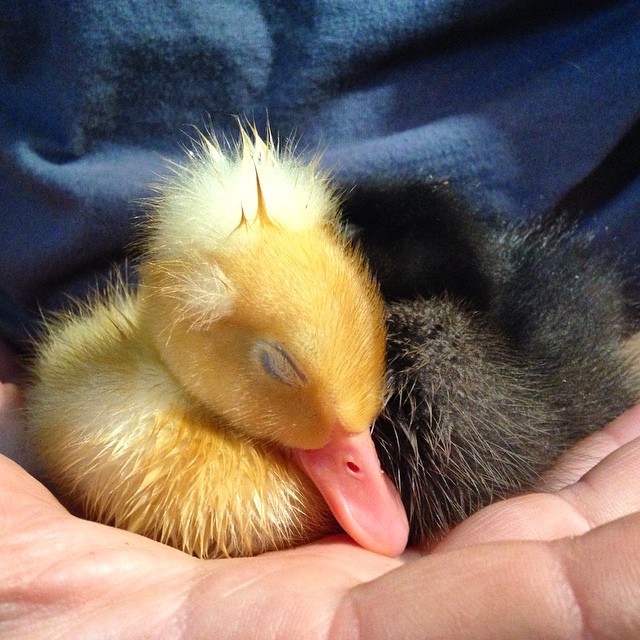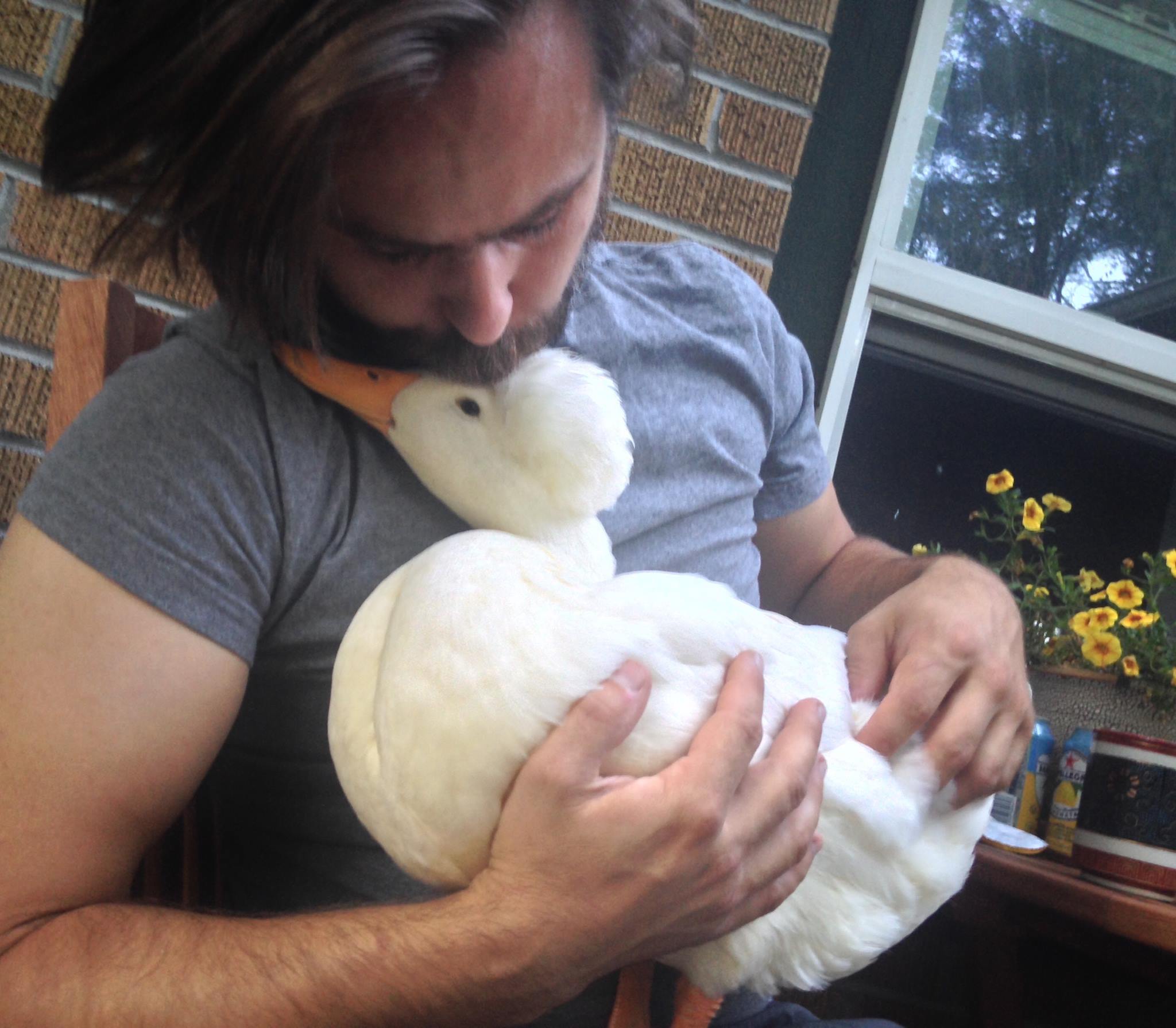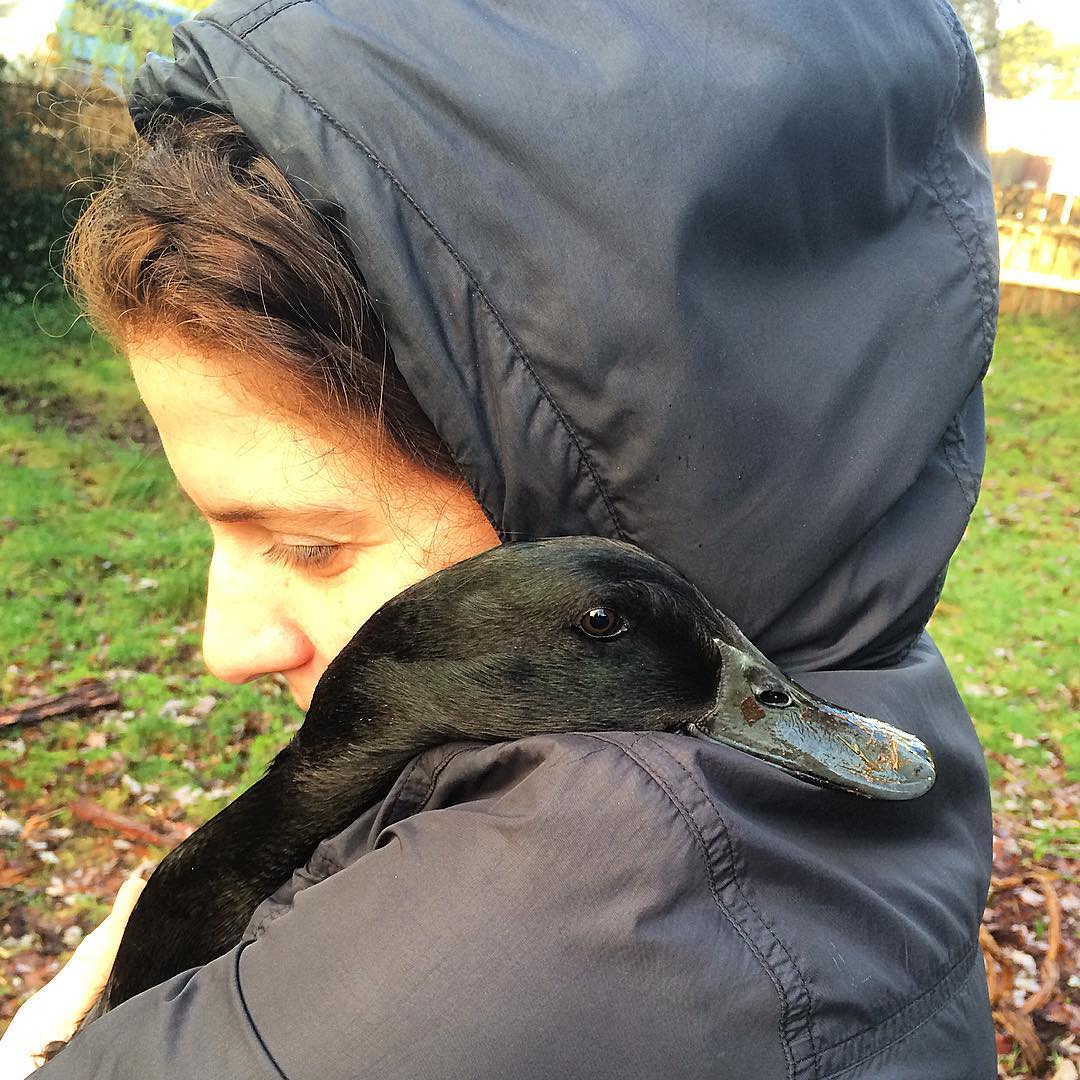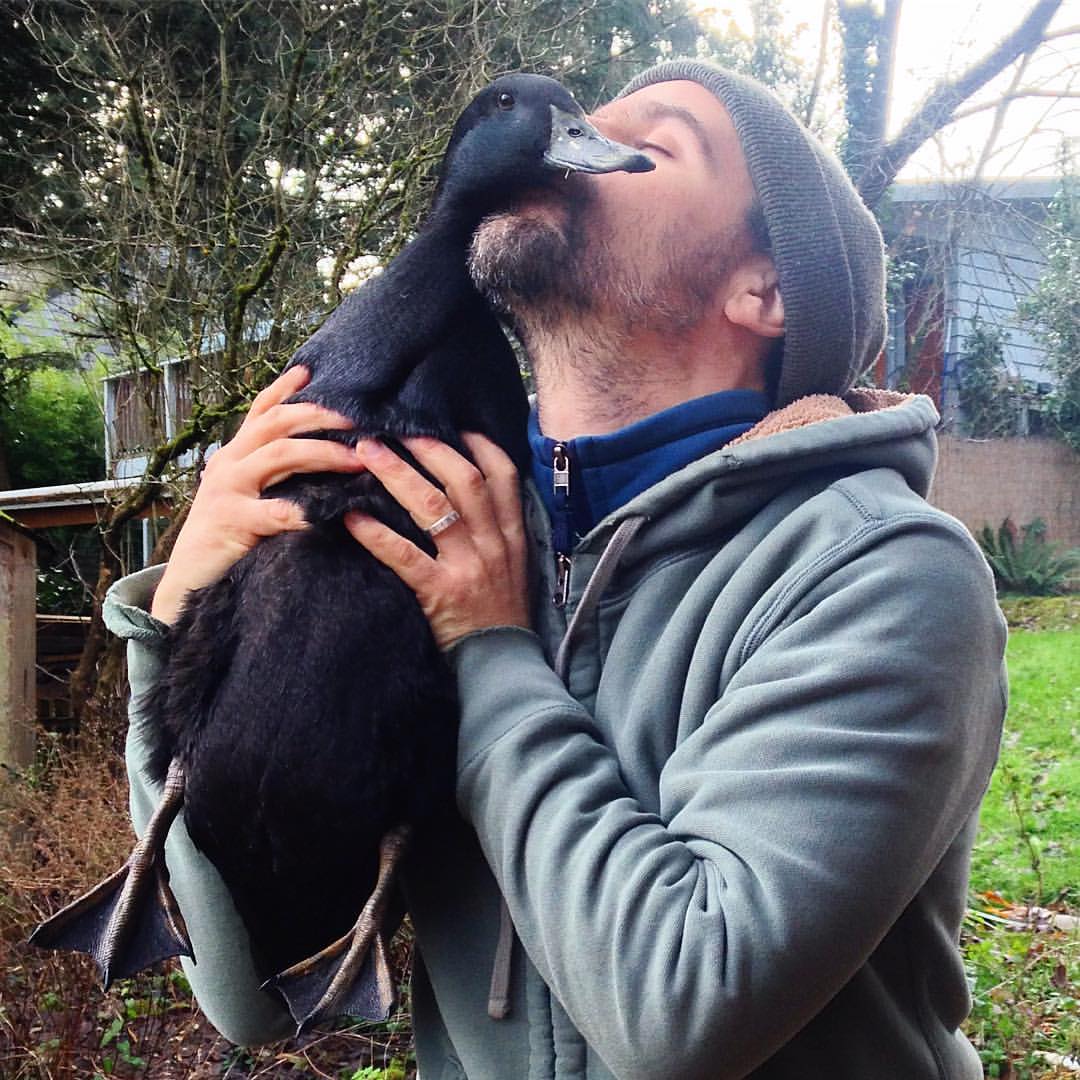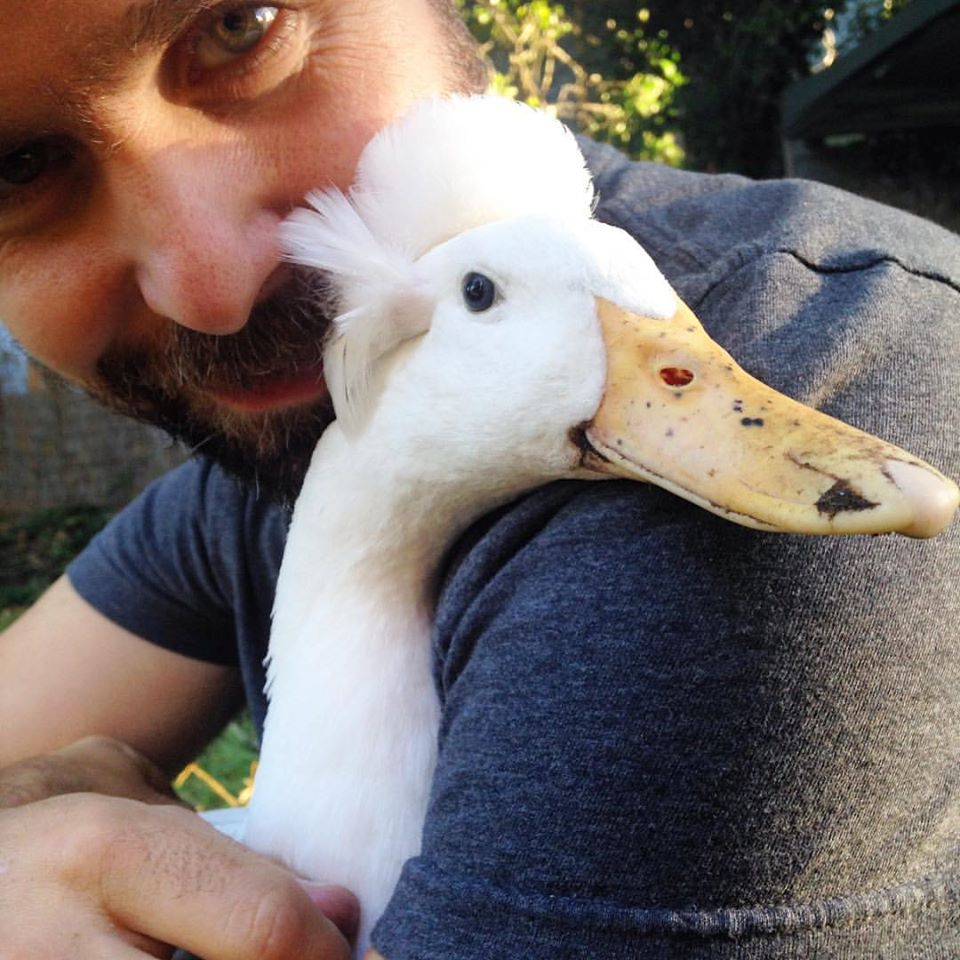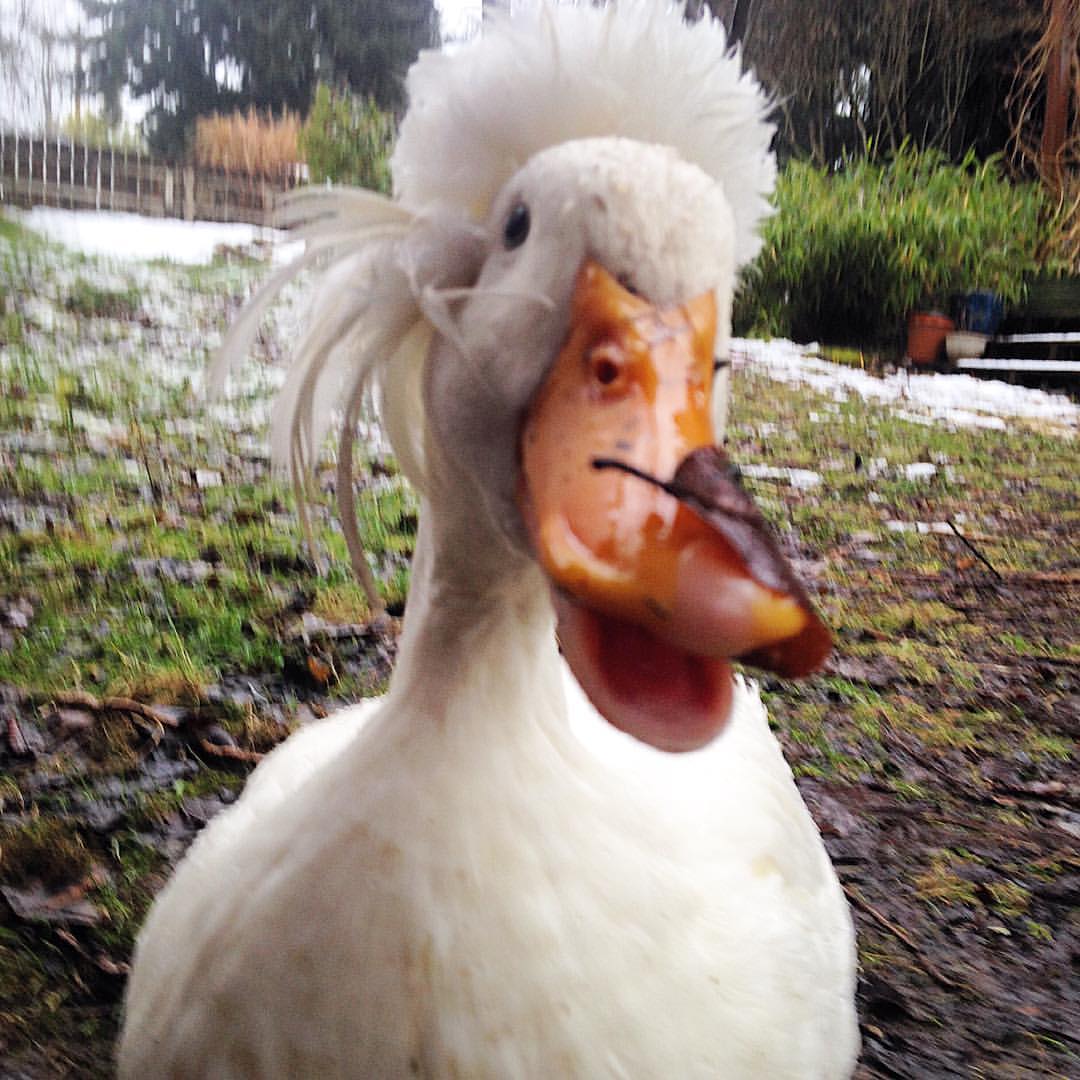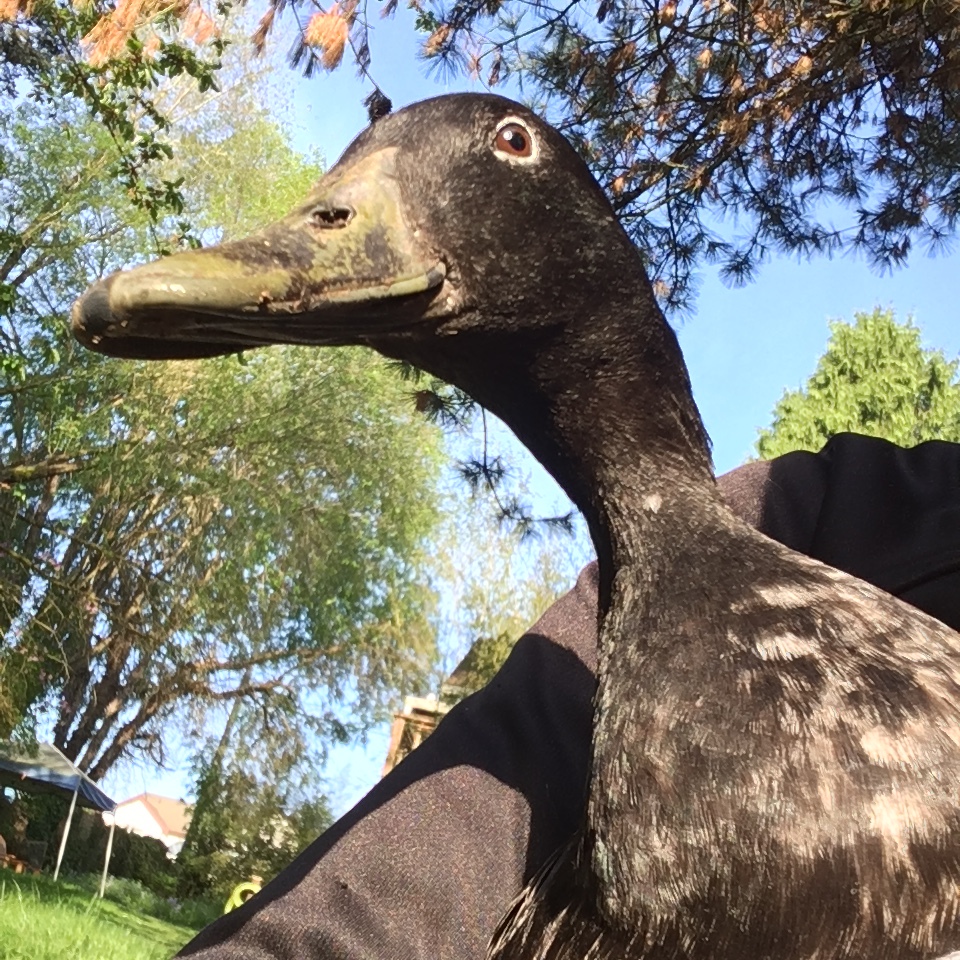We started this journey 4 years ago when we adopted two tiny ducklings in need of a home from a friend. They have changed our lives completely and continue to inspire us and others around the world everyday. Their enthusiasm and joy for life is contagious. They live in the moment and are sensitive, sweet, affectionate, and communicative. We never imagined having pet ducks would be like this.I will share what we've learned ducks need to thrive, and what to take into account before you bring them into your life. Please know that we treat these girls with the love and respect one gives their own children. May this serve and inspire you to raise happy, healthy birds as friends and family, not commodities or disposable creatures. Here is what we've learned:
1. Just like all animals, ducks are very likely to get sick or hurt at some point in their life, and will need access to proper medical care.
Before you get ducks, the number one thing to take into consideration is whether or not you have access to a veterinarian who treats ducks. Because all domesticated ducks (the kind we keep as pets) are bred primarily for meat and eggs, their health is always at risk. Their wellbeing is not a top priority for farmers trying to make a profit, as a result they often have issues arise with their reproductive organs (due to breeding to produce an obscene amount of eggs). We've experienced and seen many ducks get sick from staph infections on their feet (bumble foot), reproductive tract infections, respiratory infections, and digestive illnesses. Ducks can have neurological issues like seizures, they can get sick from moldy food or bedding or eating a small piece of metal on the ground (more common than you might think) and most frequent and most dangerous, getting attacked by a predator. Ducks are extremely predator prone and a single attack is often fatal. If they survive, immediate medical attention for pain meds, antibiotics, and wound care is essential. Their anatomy is unique and not all vets will know how best to treat them. Please take the time to find a certified avian veterinarian in your area who is very familiar with caring for ducks before you get any, this will be essential for their wellbeing and your overall health as a duck parent.
2. Ducklings (and full grown ducks) are a HUGE time commitment. Plan to give your ducks the next 10-15 years of your life.
I can not stress enough how much we underestimated the amount of time we would spend caring for these beautiful birds. As ducklings, they need to be in a safe, warm indoor space until they are fully feathered, usually around 2 months old. We kept ours in a giant rubbermaid tote in our laundry room until they outgrew that, then transferred them to a playpen in our kitchen. As you can imagine, having two large, loud, and needy birds in a small kitchen is kind of intense. We made it work, but it's not something to take lightly. They poop a lot. This means a lot of cleaning, all the time. And your house will smell like duck poop (not great). They also need to clean themselves with water everyday. We let them swim in a giant plastic tub in our shower, which would fill with duck poo and need to be changed very frequently. Again, lots of cleaning, lots of water and feathers everywhere.. Until they are fully feathered they can't dry themselves properly, so need to be towel dried and kept warm every time they get wet. They also need and like to be snuggled as they would have a parent duck to snuggle up to normally. You are now mama/dada duck. This means we'd wake up to baby ducks crying in the middle of night and my husband would sit with them and rub their bills until they fell back asleep. As they got older they'd wake up with the sun, often around 5am, and want to get out of their crib to play. We would have to get up with them no matter how tired we were. Now as fully grown adult ducks they live outside in their own house, but still wake up with the sun and go to sleep with the sunset. This means we have to be home to let them out to forage every morning, and every afternoon/evening. If we aren't here we have to hire a duck sitter to do it for us. If you travel a lot, ducks would be very difficult pets to keep unless you have very reliable caretakers on board. Please note, if you suddenly realize duck care isn't for you, you can not release domestic ducks into "the wild". It is both illegal and cruel to leave them in a park, at a lake, or in a pond. They are not bred to be capable of caring for themselves in nature as wild ducks can. They cannot find enough food on their own to survive, and cannot fly away from predators or migrate to escape the cold. THEY ARE NOT WILD DUCKS. Do not get ducklings because they are cute then release them, they will likely die a painful death due to your negligent actions.
3. Ducks need extremely secure, comfortable, clean housing and room outside to forage.
We put a good deal of work into researching, designing, and building a duck house that we hoped would work for our girls. Our priorities were that it be safe, easy to clean, and look nice. Safety is the main priority as we heard horror stories of duck houses being raided at night by persistent raccoons, digging coyotes and wily foxes. I never want to wake up to see my babies dismembered, so it became essential that we take their safety very seriously and build them a home with the highest security. Luckily their Dad is a talented artist and carpenter so he was able to design and build their dream house, but even if he wasn't we would still put the highest priority on creating a safe space for them. This means that all walls, doors and windows need to be 100% secure. No gaps, no holes, no wide chicken wire mesh that raccoons can stick their hands through. They can grab a duck through the mesh, choke them to death then eat them through the fencing. Terrifying. We were sure to use solid wood for all the framing, 1/4" hardware cloth secured with lathe screws for all of the ventilation and open air windows, and hardware cloth (screwed to the walls and covered with dirt) under the entire space of their private garden so that nothing could dig up into the garden and hurt them. It's important to remember that their safety is at risk even during the day. We have marauding raccoons wandering through our yard in the morning, eagles and hawks circling overhead and the occasional coyote looking for a quick snack. Because of this we knew they'd be spending most of their day in the comfort of their enclosure while we're at work, then coming out to forage a couple times a day when we could supervise them. This means we made an effort to give them the largest, most comfortable enclosure possible, complete with garden and built in pool, so that they would be happy there at all times of day or night. It also means that we need to be here to supervise them for outside forage time 2-3 times per day for many hours at a time. It's a huge commitment. In addition we spend around 20 minutes every morning cleaning their house and pool so they are comfy for the day. More time on the weekends to do a deep clean. Then there is the amount of water we use to clean and fill their pools, the amount of wood shavings they go through for comfortable, clean bedding, and general maintenance of their garden (new sand, soil, etc). You don't have to have the absolute perfect set up, but safety and comfort for the birds is key. There is a lot of time and cost to take into consideration.
4. Ducks need proper nutrition and access to grit, healthy grass, soil, weeds and bugs untreated with pesticides.
We feed our ducks an organic unmedicated layer feed mixed with brewer's yeast. The brewer's yeast is essential for ducks as they need the extra niacin for foot and leg health. It seems to prevent staph infections (bumble foot) from developing on their feet, which is quite common, can be very painful and if left untreated can be very damaging to their bones and joints and even become fatal. We recommend checking every duck's feet once a week (we do a Saturday foot check) and look closely for any signs of bumble foot. It usually starts out looking like a wart or black dot then gets swollen and painful. (If you notice this please treat them immediately with warm epsom salt foot soaks and take them to the vet for evaluation). We are sure to clean their food bowls daily, we use clean water and apple cider vinegar to scrub them out and fill with fresh food and make sure they always have a good supply of fresh clean water. Ducks need a deep enough water bowl that they can dip their heads and clean out their nose and eyes. We mix about 1 Tbsp of brewers yeast into about 1 cup of food. We ensure they have access to oyster shell at all times for added calcium for egg laying, grit (needed to digest food in their gizzard), and time to forage for grass, weeds and bugs in or yard. We also offer healthy snacks like lettuce, chopped cucumber or tomato, and occasional treats like chia seeds, watermelon and strawberries. All ducks are different (just like with people) and some like some treats while others do not. You can find lists of safe duck snacks online and experiment with what your ducks might enjoy.
5. Ducks need you to constantly monitor their health and wellbeing. They are sensitive creatures who can hide the fact that they are in pain (as prey animals must to survive).
This means that you must be very in tune with signs that something might be wrong as they won't necessarily show they are in pain or uncomfortable right away. Signs of pain, sickness or discomfort might include: not wanting to come out to forage (if they usually enjoy it), not talking as much as they normally do, not wanting to eat their food or their favorite treats, not bathing or preening as they normally would, walking differently, limping, not wanting to be touched or near other ducks, having half-closed eyes or ruffled, puffed up feathers, or hiding in a safe place. Walking with their tail pointed down, pumping their tail up or down, or standing with their foot stuck out to the back and tail down (can all be signs that they’re egg bound and are desperately trying to push an egg out). If you notice they’re having trouble breathing, have any signs of infection like swelling, skin which is hot to the touch, high temperature, or ruffled feathers with their eyes half closed; they could be battling a serious infection and need to be seen by a vet immediately. We spend so much time with our girls that I instantly know if something is wrong. If one duck is quieter than usual, I make a mental note and watch her closely all day to see if she has any other signs that something might be going on. It takes a lot of care and time spent with them to know your babies and any signals that they might be in distress. The most important thing is to spend time with them and monitor them daily so that if an issue does arise you catch it sooner and are able to get them medical care if needed. Some conditions, like bumble foot, can often be treated safely at home if caught early enough, other issues like an internal infection must be treated immediately by a trained veterinarian. Ducks have delicate, sensitive anatomy and if something goes wrong time is of the essence. If you notice a duck in distress we recommend contacting your veterinarian immediately and taking any measures you can at home to help them. A warm epsom salt bath is an amazing home remedy that works wonders for ducks and should be used if in doubt or while waiting to get them to the vet. Use a generous amount of (unscented) epsom salts, we use about 2 cups per 3-4 gallons of warm water and let the bird sit in it for as long as they will stay put. Our girls seem to really benefit from 20-30 min soaks and they really enjoy it. It helps relax swollen muscles, stop muscle spasms and help release eggs in an egg bound bird, and aids in the healing of bumble foot and other cuts and infections. Just be sure to keep a bowl of fresh water near their heads so they can drink that instead of the salt water (drinking too much epsom salt water can cause diarrhea).
6. Ducks need safety, protection, companionship, love and affection to thrive.
Contrary to what society wants us to believe, birds like ducks and chickens are not mindless, egg, feather, and meat producing machines. They are extremely intelligent, sensitive creatures who thrive in social groups of 2 or more, love to play, enjoy life, and make the most of each moment. Sadly most ducks and chickens born into this world will never be able to express their true nature as they are enslaved to be used for food sources. Ducks thrive on a sense of love, routine, and security. The question we get most often is how we got our girls to be so affectionate. The truth is that we simply respect them and their right to be themselves 100% of the time. It’s a big commitment to take care of ducks but they make every second worth it if you give them the love they deserve.
All our best on your journey into the world of raising ducks!
Renee & Nick

